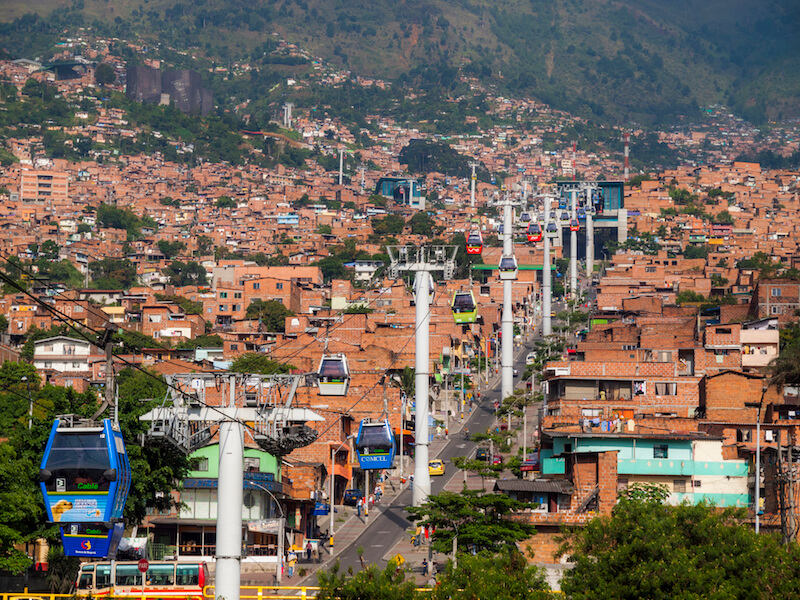Integrated strategies for socially just neighbourhoods

"If we want to achieve social justice—which means equal quality of life as well as equal opportunities for all—we must focus on the people and their living environment," says René Bormann of the Division for Economic and Social Policy of Friedrich-Ebert-Stiftung in Bonn.
Over the past ten years at FES, Rene has worked to establish programmes on transport policy, urban development, building and housing as well as tax policy to develop and promote progressive innovative political concepts with and for policymakers at the federal level in Germany.
To understand better the efforts by FES on issues regarding urban development, we put questions to Rene about some of the ideas and motivations that have guided his work, the current situation with urban development in Germany and the political work necessary to address it.
As part of your work on urban development, you led the FES program on social cities. What does social city stand for?
René Bormann: The neighbourhoods we all live in can both enable and hinder a quality of life, opportunities, engagement and social and economic participation.
If we want to achieve social justice—which means equal quality of life as well as equal opportunities for all—we must focus on the people and their living environment. This is what a social city stands for. A social city promotes social cohesion and ecological and economic sustainability, and it enables participation, engagement and identification for all.
Unfortunately, the reality is often quite different.
Although all major cities in Germany are growing, the infrastructure is not developing fast enough or at least not in the right direction to cope with the change. Rising rents, long commutes, more pollution, are among the negative consequences that affect especially people with low and medium income.
What is the current situation with urban development in Germany, what issues are at centre stage, for political actors, including residents and workers?
RB: For a long time, our cities stagnated. Young people chose to live in the city, but once they reached a certain age, and were able to afford it, they would move to the outskirts or beyond. For work, shopping and social activities they would continue to return to the cities.
This posed challenges for the public infrastructure, the quality of life of the inhabitants as well as the quality of life for the commuters.
For almost 10 years now, we are witnessing a renaissance of the cities, which are growing again.
Because housing was widely available, it was left outside of the political agenda. The construction of new affordable homes develops slowly, which pushes rents significantly higher. Today, housing in the city is often too expensive even for the middle class.
The social structure of neighbourhoods is changing. The local social and cultural diversity and with it social justice and social cohesion is coming under pressure.
What do you propose to do about it?
RB: Many thought the free market would solve all our problems. We reduced the public resources on all levels of the state and sold public ground and public houses to the highest bidder.
To enable social justice and social cohesion we need a state which can shape processes rather than to administrate them.
At the same time, we need to encourage the participation and engagement of all residents, and by this promote also their identification with and their initiatives in their quarter, no matter whether it is growing or shrinking, prospering or declining, regardless of where it is, in the urban or rural areas. This requires the local administrations to act as moderators and mediators.
This also means, that instead of dividing responsibilities between different administrative departments, we need to ensure inter-departmental planning and support.
Example for integrated strategy on health: If the aim is to improve the health of residents in a neighbourhood, there may be the need of a community centre to introduce various programs on health, like nutrition counselling. Local schools will have to include similar programs in their curriculum and introduce healthy school meals. Opportunities and facilities for sport should also be improved across the board.
With integrated strategies, we can interlock the individual concepts and funding programs and will be able to unfold their full effect in the neighbourhoods. Instead of developing various programs focusing on single topics, we need targeted integrated programs. This requires collective thinking across departments and has to be focused on the needs of the specific neighbourhoods.
Local politicians and administration commonly act only when difficulties arise in a specific neighbourhood. Instead, our cities need resources and instruments to initiate preventive measures on time. A regular evaluation of the development of all neighbourhoods combined short term reactions and adjustments can help identify where the needs reside.
How do topics relevant to your work in Germany on urban development resonate across other parts of the world?
RB: In 2014, I started a project called Social Quarter. People from different backgrounds— for example, a consultant for elderly care, a project manager for integrated urban renewal, politicians from national and federal level, lecturers working in the field of architecture as well as urban sociology—discussed the highpoints and the shortcomings of urban developments. Based on those exchanges, we developed recommendations for concrete strategies to achieve social neighbourhoods and thereby social cities.
To get a broader perspective on the developments of neighbourhoods and policies to promote social cities, we went on a fact-finding mission to Colombia. In cooperation with the resident FES office, we visited the capital Bogotá and the former infamous city of Medellín, known today for its innovative, integrated and sustainable urban development. It was impressive to see how policies—together with the administration, residents and business—transformed troubled neighbourhoods into places with a high quality of life and opportunities for all inhabitants. I think that during the journey we learned more from the Colombians than they learned from us.

Last year, I was invited to Indonesia, Malaysia, Vietnam, and Seoul to an exchange of perspectives and policies towards achieving more social cities. I was impressed how similar the challenges and the strategies to tackle them are. I also saw how important it is to have political visions and strategies for urban development and not leave this development to the market.
Moreover, the journey made it clear to me that anyone who wants to enable liveable and social cities, needs to have answers to the challenges of rural areas, too. This is the only way to reduce migratory pressure and traffic problems in cities. At the same time, this helps to improve the living situation in the rural regions, easing off the budget and time pressure that come about with commuting.
These insights where the reason why I started a project on strategies for the rural areas in Germany.
What drives your interest in the political work on urban development? How does it matter to you?
RB: There is a saying “city air makes one free”. Even if cities and communities with their local quarters are continuously challenging their inhabitants because of their ever-changing nature, they are sources of prosperity, innovation and social integration.
In our current situation, with increasing inequality and a high level of migration from the rural areas as well as from Europe and other parts of the world, we urgently need to make use of the exceptional opportunities for social and economic development that cities have shown in recent years.
I’m deeply concerned how a wealthy country like Germany fails to achieve social justice and social cohesion. We are far away from being a country with equal quality of life as well as equal opportunities for all. To achieve a more social society, I will continue to work on reinforcing the strengths and potentials of communities. ###
About FES Connect
Connecting people, in the spirit of social democracy, we source and share content in English from the German and international network of the Friedrich-Ebert-Stiftung.




